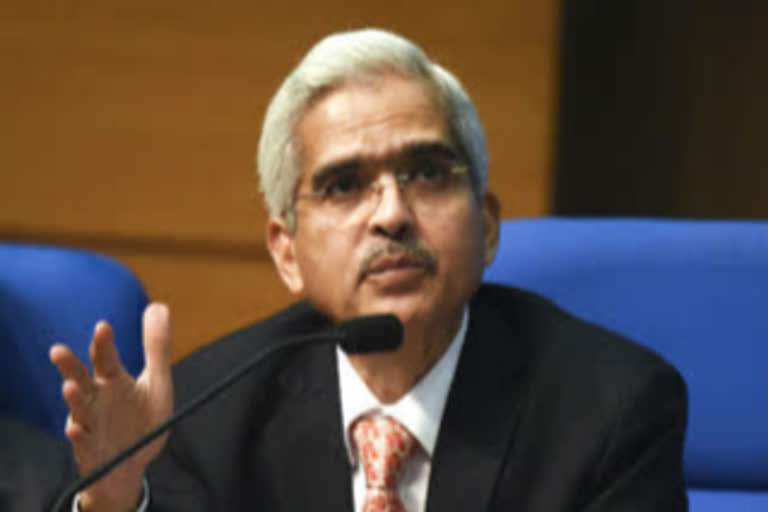Mumbai: Stating that growth impulses and the fast-moving economic indicators are strong, Reserve Bank Governor Shaktikanta Das on Wednesday exuded confidence in the economy clipping at the projected 9.5 per cent growth this fiscal. Crediting the many measures taken by the government and the RBI for the faster-than-expected recovery so far, Das said the fiscal and taxation reforms especially have played key role in driving growth and reviving confidence.
These measures will continue drive growth going forward. But as the monetary measures have almost reached its limits, going forward the government has to be in the forefront to drive faster growth and the central bank can continue to support to revive the economy ravaged by the pandemic. Citing the slew of measures the government has taken since the pandemic struck in March 2020, the governor specifically mentioned tax cuts on fuels, tax resolution for the telecom sector, annulling of the retro tax legislation, sale of Air India, plans to sell some of the public sector banks and PLI scheme as the major reforms and growth-drivers bearing fruits now.
"Though soaring global crude prices and many geopolitical issues along with other global headwinds are challenges to growth, the overall growth outlook is very positive for us. I am very confident that our GDP will comfortably grow by 9.5 per cent this fiscal because all growth impulses are very strong, and the fast-moving indicators are stronger.
"Our assessment is that we are on a path of reaching the 9.5 per cent growth comfortably," Das said at a function organised by financial daily Business Standard here this evening.
But there are global headwinds as advanced economies, which have recovered faster from the pandemic and had posted higher growth numbers earlier, seem to have moderated now, he noted, putting question marks on the 5.9 per cent global GDP forecast.
Given all these global GDP may undershoot the 5.9 per cent target due to shortages of semiconductors, shipping containers, and the resultant soaring freight rates, among others.
But on top of all these is that many European, Asian and American countries are still fighting the pandemic, Das said, warning this should ensure that there is no room for complacency at all. He also based his growth optimism on the indications coming in from bankers that investment loans are making a slow come back and will pick up steam from the next fiscal.
"Our recent interaction with bank CEOs make me confident that demand for investment capital is making a slow come back and should gather momentum from the next fiscal," he said, when asked whether he is worried that for the first time retail loan book at Rs 28.58 lakh crore - driven largely by home loans - has surpassed corporate loan book of Rs 28.28 lakh crore as of July this year.
"Loans will go where there is demand. As of now, there is great demand for housing loans for one as we are now, in the lowest interest rate regime and ample liquidity, and for another, many people are looking for more spacious homes due to the pandemic," he said. So it is up to banks to do risk pricing very carefully in terms of sectoral allocation of their assets. Each bank has to do its due diligence and determine the risk appetite, Das noted, parrying a direct answer to the question of whether he sees any bubble in the retail books.
The governor also discounted the fears being raised about the government being forced to infuse capital into the RBI as in the past three years it had taken out a lot of the central bank's reserves as dividends.
One report has pegged that the government will have to infuse at least Rs 57,000 crore to maintain the over 20 per cent capital buffer that the Bimal Jalan panel had recommended.
However, Das said, "This is an alarming forecast and there is no way that the government will have to infuse capital into the central bank. But we have more than four months left to close the fiscal and we will know the exact position only by the end of the year.
Also read: Accurate audit reports essential for stability, growth: Das
But all I can say is that the forecast is alarming and there will not be any need for capital infusion into the bank. This is purely speculative. Government injecting capital into the RBI will not happen as it is very alarmist and we don't foresee such a position, he said.
On the rising forex reserves to the tune being called the Dutch problem now, he said most of the forex is built through current account deficits and we are basically a current account deficit country. "Our reserve accretion is happening through foreign capital inflows but that also makes us responsible to make adequate reserve positions. Our point is that we should not fall back into a crisis due to low forex as happened in the summer of 2013 with the Fed's taper tantrums. "We want higher reserves to deal with any volatility in the forex markets as happened from May through August of 2013. We should not revisit that episode. In a way CAD is good as it brings in capital from outside."
PTI



